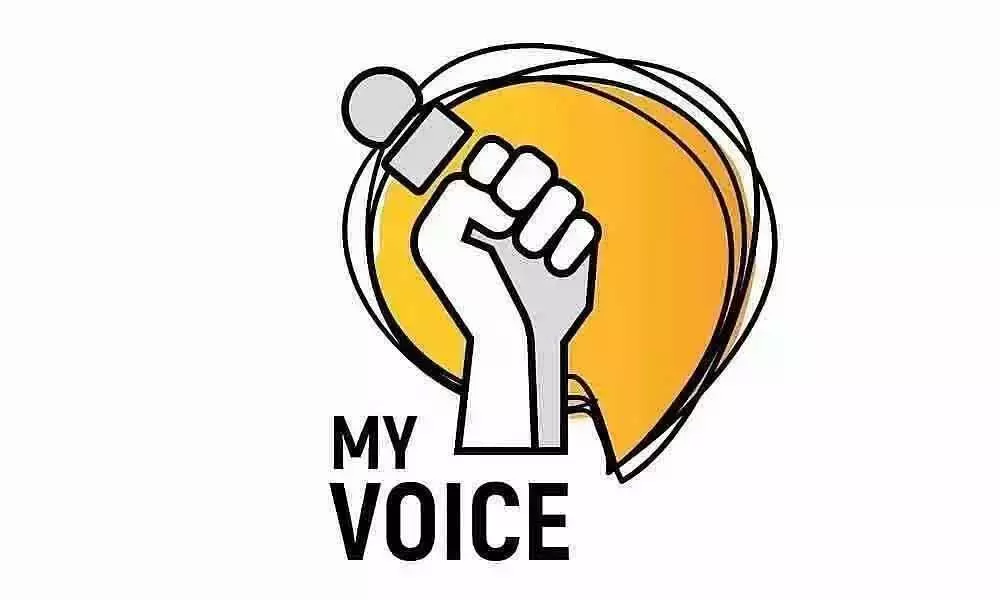Live
- Tim Southee matches Chris Gayle's six-hitting record in his farewell Test
- AP Mnister Ponguru Narayana Inspects Highway Connectivity Roads to Amaravati
- Reduced inflow: Water levels in Chembarambakkam, Poondi reservoirs drop
- Slapgate haunts CM as Rohini slams Nitish following Patna DM’s action against BPSC candidate
- Amazon Music India Unveils 'Best Of 2024’ Celebrating Top Hits, Artists & Podcasts
- Kejriwal writes to HM Shah on law and order, seeks urgent meeting
- Big e-commerce firms to adopt Safety Pledge on National Consumer Day
- Cop ends life over torture by wife, father-in-law in Bengaluru
- Indian Constitution longest and most beautiful, Kiren Rijiju lauds its inclusive character
- BSNL's Rs 333 Plan Challenges Airtel and Jio with 1300GB Data: Details
Just In
MyVoice: Views of our readers 7th September 2020


MyVoice: Views of our readers 13th October 2020
It may be remembered that last year, Sonia Gandhi had set up a 17-member group to deliberate upon key issues of the day
Congress should find a head
It may be remembered that last year, Sonia Gandhi had set up a 17-member group to deliberate upon key issues of the day. The group comprised former Prime Minister Manmohan Singh, Rahul Gandhi, Ahmed Patel, Ghulam Nabi Azad, AK Antony, Mallikarjun Kharge, Anand Sharma, Jairam Ramesh, Ambika Soni, Kapil Sibal, KC Venugopal, Adhir Ranjan Chaudhary, Randeep Singh Surjewala, Jyotiraditya Scindia, Rajeev Satav and Sushmita Dev. Scindia left the Congress in March 2020. It has been over a year since the group was named, but barring one meeting on October 25, 2019, it has not met. Instead, Rahul has been selecting and raising issues on his own 'whims and fancies'. In nutshell, Rahul's personality and his choice of issues are a primary source of disquiet in the party. When a group of dissenters had begun talking among themselves to force change and reform from within the party, one of them had quipped, "assuming that the Congress is a body, we need to figure out where the problem lies - is it the head, chest, stomach, kidney, liver.? Three of them had responded in unison: "it is the head!" The present-day Congress doesn't lack leaders who want a Rahul-led Congress to taste every electoral success but wish he fails in his efforts to cleanse the party.
Sridhar Vanavolu, Anantapur, AP
India needs a data protection law
On August 26, the National Health Authority released a press statement to announce that it had drafted the Health Data Management Policy. The objectives of the draft policy have been laid down as creating a system of digital personal and medical health records, which is voluntary and based on the consent of individuals, and which allows for the secure exchange of health data with enough privacy safeguards. The document identifies individuals as "data principals" who would voluntarily acquire unique health IDs, which would be used to electronically store their personal health records. The records would be generated by "health information providers" – hospitals, diagnostic centres, public health programmes. "Health information users" – for instance, insurance companies – will have to place requests to access these records. Access would require the consent of individuals through "consent managers". The draft policy outlines a framework for obtaining individuals' consent – both for the collection of personal health records, as well as for accessing them. India does not yet have a data protection law. A bill is still pending in Parliament. But privacy lawyers say leapfrogging over a law is a bad idea. The health data policy would create a parallel mechanism even before the data protection bill was enacted.
Vinod Kumar Reddy P, Hyderabad
Children should not be put to risk
It is ironical that some are demanding schools to reopen. Several studies show children and adults have similar amounts of viral RNA in their nose and throat. This suggests children and adults are equally infectious, although it is possible that children transmit the virus slightly less often than adults in practice. Because children are physically smaller and generally have more mild symptoms, they might release less of the virus. Teenagers are of course closer to adults, and it is possible younger children might be less likely to transmit the virus than older children. However, reports of outbreaks in childcare centres and primary schools suggest there is still some risk. Large clusters have been reported in schools around the world, most notably in Israel. There, an outbreak in a high school affected at least 153 students, 25 staff members, and 87 others. Interestingly, that particular outbreak coincided with an extreme heatwave where students were granted an exemption from having to wear face masks, and air conditioning was used continuously.
Shivasodhana Ch, Vijayawada, AP

© 2024 Hyderabad Media House Limited/The Hans India. All rights reserved. Powered by hocalwire.com






